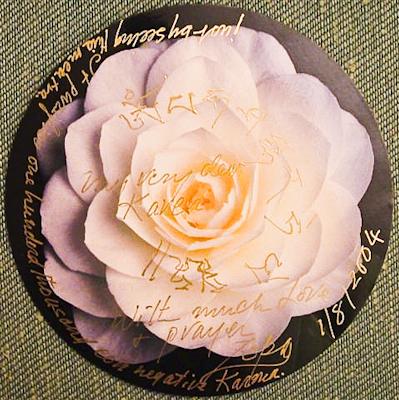Dear Friends,
Thanks for subscribing to our monthly e-letter. Feel free to share it with others!
In this month's issue, we have a new video and podcast from the archive to share with you; the latest installment of the Big Love audiobook heart project; several talks by Lama Yeshe and new advices posted to our website; an update on our big sea shipment of LYWA titles to Australia; and news of the upcoming anniversary of Rinpoche's passing away. Please read on and enjoy.
From the Video Archive: The Power of the View
This month from the video archive, we bring you the fourth excerpt from a Dharma discourse given by Lama Zopa Rinpoche at Maitreya Instituut, Amsterdam, in November 1998. In this excerpt, Rinpoche discusses how everything depends on what we do with our minds, how we have the power to change our view from attachment and ignorance to patience and wisdom, and how by doing so, we remove all problems in our lives and become the cause of peace in the world. You can find all four video excerpts from this discourse here on our YouTube channel.
Visit and subscribe to the LYWA YouTube channel to view more videos freely available from our archive. See the FPMT YouTube channel for many more videos of Lama Zopa Rinpoche’s teachings.
On the LYWA Podcast: How We Name The World
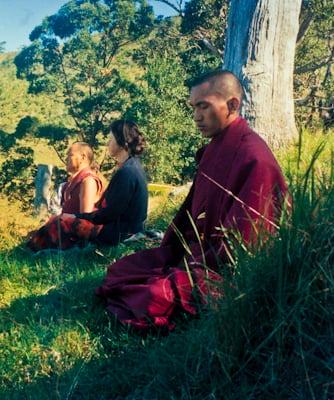 Every single phenomena is like that. There’s merely gathered, the base to be labeled, then due to that, then mere imputation, then only after that, then you have that appearance.
Every single phenomena is like that. There’s merely gathered, the base to be labeled, then due to that, then mere imputation, then only after that, then you have that appearance.
—Lama Zopa Rinpoche
This month on the LYWA podcast, listen to teachings by Lama Zopa Rinpoche given during a lamrim retreat held at Vajrapani Institute in Boulder Creek, California, from August 20-23, 2006. By using the example of a child too young to speak, Rinpoche explains how everything experienced is merely imputed by the mind. If a child doesn't know the name of something, does it exist? You can follow along with the transcript here on our website.
The LYWA podcast contains hundreds of hours of audio, each with links to the accompanying lightly edited transcripts. See the LYWA podcast page to search or browse the entire collection by topic or date, and for easy instructions on how to subscribe.
BIG LOVE AUDIOBOOK HEART PROJECT
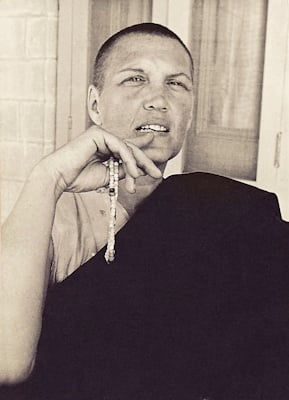 We’re happy to share with you another audiobook installment of Big Love: The Life and Teachings of Lama Yeshe, written by Adele Hulse. Organized by Janet Brooke, this heart project is comprised of narrations recorded by personal friends of the late Åge Delbanco (Babaji), one of Lama Yeshe's earliest students.
We’re happy to share with you another audiobook installment of Big Love: The Life and Teachings of Lama Yeshe, written by Adele Hulse. Organized by Janet Brooke, this heart project is comprised of narrations recorded by personal friends of the late Åge Delbanco (Babaji), one of Lama Yeshe's earliest students.
This month from the Big Love Heart Project, we bring you Chapter 6: 1968: Zina Is Ordained, narrated by Lara Brooke. Chapter 6 describes Zina Rachevsky's decision to become ordained, how Lama Yeshe guided Zina to ordination in Nepal, and the fortuitous reunion of Zina and "Mummy" Max Mathews.
WHAT'S NEW ON OUR WEBSITE
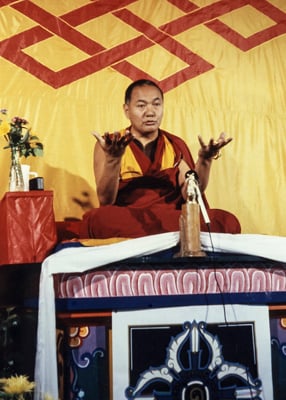 This month we have posted several of Lama Yeshe’s talks on our website. The excerpts were previously shared in our monthly e-newsletters and are now more easily accessible as stand-alone articles. Lama discusses meditation on emptiness and clarity of mind as part of a commentary on Chenrezig (Avalokiteshvara) practice. In teachings on the Gyalwa Gyatso yoga method, Lama encourages the cultivation of love, compassion and wisdom, advises how to nourish these qualities, and emphasizes the importance of avoiding extremes and practicing intensive awareness. These talks were given in 1980 and 1983 at Grizzly Lodge in California and Istituto Lama Tzong Khapa in Italy respectively.
This month we have posted several of Lama Yeshe’s talks on our website. The excerpts were previously shared in our monthly e-newsletters and are now more easily accessible as stand-alone articles. Lama discusses meditation on emptiness and clarity of mind as part of a commentary on Chenrezig (Avalokiteshvara) practice. In teachings on the Gyalwa Gyatso yoga method, Lama encourages the cultivation of love, compassion and wisdom, advises how to nourish these qualities, and emphasizes the importance of avoiding extremes and practicing intensive awareness. These talks were given in 1980 and 1983 at Grizzly Lodge in California and Istituto Lama Tzong Khapa in Italy respectively.
Every month we share new advices for Lama Zopa Rinpoche’s Online Advice Book, adding more than 100 new entries every year on a variety of topics. More precious than ever, there are now more than 2,200 of Rinpoche’s advices online. Here are a few more:
- How to Support Sibling with Mental Health and Addiction Challenges: A student wrote that her brother had been struggling with addiction and mental illness. The student sought advice on how to help him find a path toward recovery and improved well-being.
- The Healing Power of Blessed Water: Rinpoche gave some blessed water to a medical clinic, along with this letter, which explains the benefits.
- Using Unfavorable Conditions on the Path to Enlightenment: A student asked Rinpoche about leaving their partner, who was mentally unwell and had been abusive. Rinpoche sent this advice about cherishing others, even those who harm us.
You can always find a list of all the newly posted advices from Lama Zopa Rinpoche on our website.
From the Home Office to the Great Stupa
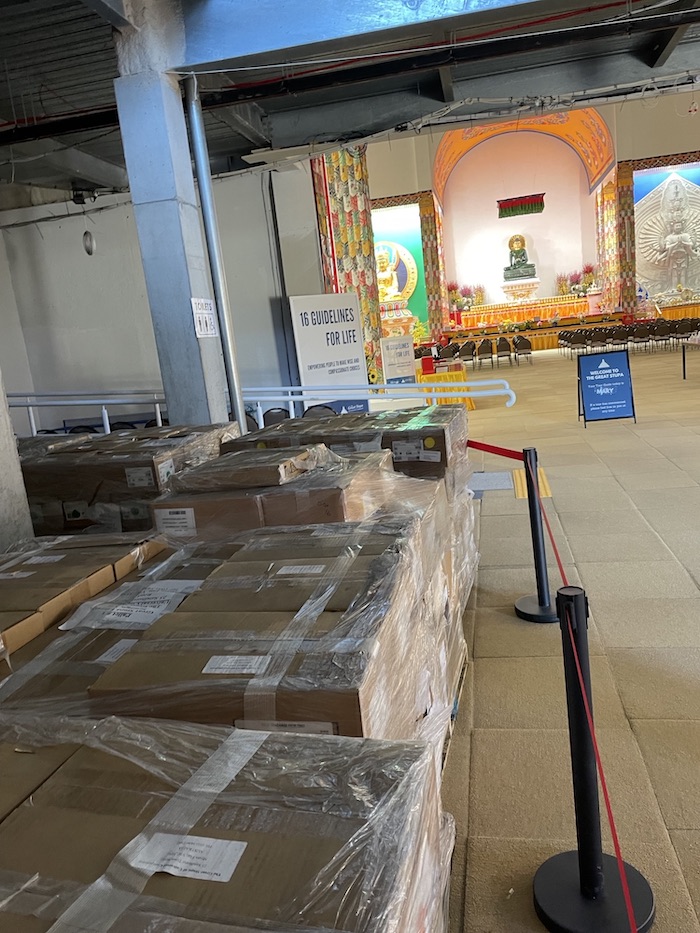 The sea shipment of LYWA books to Australian FPMT Centers has arrived! This shipment contained over 14,000 copies of LYWA titles, including our two latest titles Knowledge-Wisdom and Silent Mind Holy Mind, as well as reprints of our most popular titles and twenty boxes of Dharma materials for the Great Stupa Library. If you live near an FPMT Center you will soon be able to pick up a free copy of our books there. And if you don’t, you can see last month’s eletter for other options.
The sea shipment of LYWA books to Australian FPMT Centers has arrived! This shipment contained over 14,000 copies of LYWA titles, including our two latest titles Knowledge-Wisdom and Silent Mind Holy Mind, as well as reprints of our most popular titles and twenty boxes of Dharma materials for the Great Stupa Library. If you live near an FPMT Center you will soon be able to pick up a free copy of our books there. And if you don’t, you can see last month’s eletter for other options.
We are so grateful to our supporters who enable us to edit and publish the precious teachings of our Lamas, as well as reprint copies of our free titles that have reached so many interested students around the world. Please make your donation to LYWA to help us continue this impactful work.
First Anniversary of Rinpoche's Passing
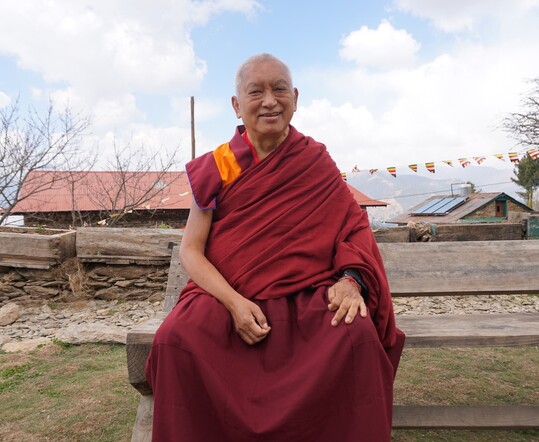 One year ago on April 13, 2023, our precious spiritual friend, Lama Zopa Rinpoche, showed the aspect of passing away. A commemoration will occur at Kopan Monastery on April 13 followed by a Heart Sutra Retreat from April 15 to 20 and a special Lawudo Pilgrimage from April 25 to May 9, honoring Rinpoche as the Lawudo Lama by visiting the main holy places of the area with prayers and practices for Rinpoche's swift return. Both retreats still have spots available.
One year ago on April 13, 2023, our precious spiritual friend, Lama Zopa Rinpoche, showed the aspect of passing away. A commemoration will occur at Kopan Monastery on April 13 followed by a Heart Sutra Retreat from April 15 to 20 and a special Lawudo Pilgrimage from April 25 to May 9, honoring Rinpoche as the Lawudo Lama by visiting the main holy places of the area with prayers and practices for Rinpoche's swift return. Both retreats still have spots available.
You can refer to Advice for the Anniversary of the Guru’s Passing Away, a short text translated by Rinpoche explaining the importance of making offerings on the anniversary of the passing away of one’s guru. It sets out the benefits of making offerings, how to make the offerings with six remembrances, and how to offer and dedicate the roots of virtue collected.
We'd also like to share FPMT's 2023 Annual Review: Repaying the Kindness, Looking to the Future.
As always, thank you so much for all your support. We truly couldn't do it without you! Read on for this month's teaching by Rinpoche on how to integrate Dharma while shopping.
Big love,
Nick Ribush
Director
THIS MONTH'S TEACHING: Shopping with Dharma in your heart
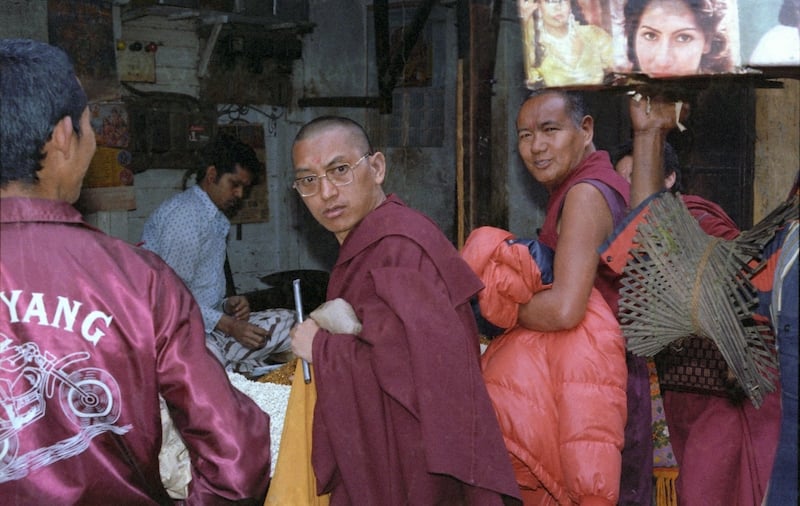 When we shop with the lamrim, with renunciation, bodhicitta and right view, it becomes the cause of enlightenment. With bodhicitta, our shopping is only for others; all our activities are only for others. Whatever we do in our daily life, when we do it with bodhicitta, it is only for others. So, all this shopping becomes the cause of enlightenment. I’m using this as an example, but all our activities in daily life done with bodhicitta become the cause of enlightenment.
When we shop with the lamrim, with renunciation, bodhicitta and right view, it becomes the cause of enlightenment. With bodhicitta, our shopping is only for others; all our activities are only for others. Whatever we do in our daily life, when we do it with bodhicitta, it is only for others. So, all this shopping becomes the cause of enlightenment. I’m using this as an example, but all our activities in daily life done with bodhicitta become the cause of enlightenment.
Everything becomes Buddhadharma with renunciation, right view and bodhicitta. And when it is done with the meditation on emptiness, it becomes the antidote to samsara. In that way, our shopping becomes the antidote to samsara. Walking, sightseeing, it’s the same—it becomes the antidote to samsara; it doesn’t become the cause of samsara.
When we do a sadhana and we visualize the deity, if we do it with the emptiness meditation and an awareness of dependent arising, how because it arises dependently, it exists in mere name, merely imputed by mind, or if we look at it as a hallucination—although it appears as something real, we look at that which is hallucination as a hallucination—if we do that, it becomes the antidote to samsara; it doesn’t become the cause of samsara. Otherwise, there is the danger of it becoming the cause of samsara. Here, even doing our tantric practice becomes the antidote to samara.
Any normal activities we do, like eating food—if, while we are eating food, we meditate on how the I, action of eating and the object, the food, exist in mere name, merely imputed by mind, or if we look at everything that appears to us as something real and see it as a hallucination, how the food, ourselves as the eater and the action of eating all appear real while we understand that all these, which are hallucinations, we look at them as hallucinations, that is the antidote to samsara. What comes in the heart is that these are all empty. Even without thinking they are empty but looking at them as hallucinations—which they are—the result is to feel in our heart that these are empty. So, again, eating food becomes pure Dharma; it becomes the antidote to samsara.
Similarly, while we are working. I’ll mention this but keep it short. I mentioned being in a meeting as an example, but also, while we are cleaning, cooking, writing, being a secretary, even if it doesn’t happen continuously, we should try to remember from time to time with mindfulness of the gag cha or of dependent arising, looking at things as empty. Even if we cannot continuously develop that mindfulness, we should try to remember again and again.
All those times that we work like that, even doing secretarial work, that mind of emptiness becomes the antidote to samsara; it becomes the heart of the 84,000 teachings of the Buddha, the heart of lamrim.
It becomes the antidote to the root of samsara. Every time we do it, it leaves more and more imprints until we have a realization of emptiness. It is imaginary at first, then later we have the direct perception, which ceases karma and delusions, ceasing first the gross negative imprints of delusions, then the subtle ones. Then, with bodhicitta we create a lot of merits with six paramitas, the deeds of the bodhisattva, and we are able to cease the subtle negative imprints, thus achieving enlightenment.
This is how to integrate the Dharma in our busy life, the entire lamrim practice and the three principal aspects of the path. Here, I’m particularly talking about emptiness at this point.
Then, we will constantly have peace in our heart. Negative emotional thoughts will not arise, such as fear, attachment, depression, all these. We are always calm, peaceful, with an open heart, not a closed one. We have a very healthy mind, a very open heart; we have space to generate loving kindness and compassion for others. When there are minds like anger or attachment, they block the development of compassion, the pure, unconditional loving thought.
Excerpted from the lamrim teachings given by Lama Zopa Rinpoche at the 40th Kopan Meditation Course, held at Kopan Monastery, Nepal, in November-December 2007. Lightly edited by Gordon McDougall. Find more topics from this course on our website and download a PDF of the entire course here.























